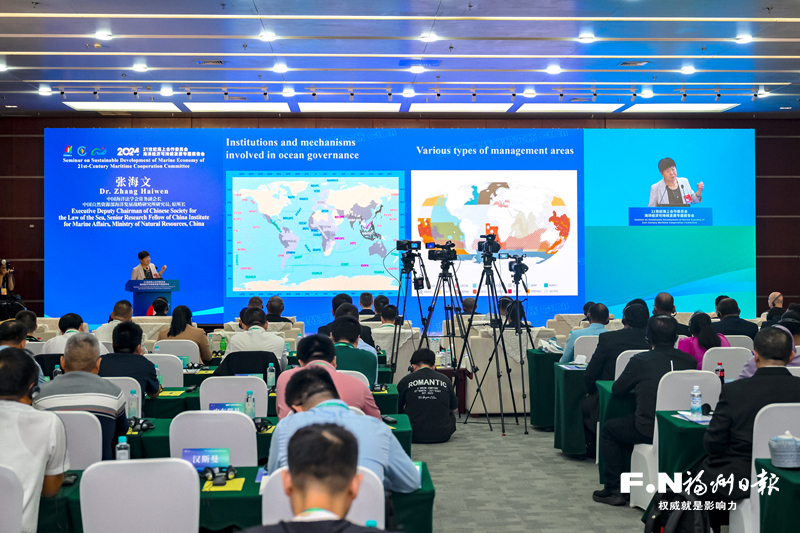The Seminar on the Sustainable Development of Marine Economy of 21st Century Maritime Cooperation Committee Was Held
Jointly Protecting Humanity’s “Blue Home”
The ocean nurtures all things and holds the future.
A grand event brought together guests from all directions to discuss collaborative governance of ocean-related issues, share experiences on marine economic development, and provide advice on building a maritime community of shared future. On November 15, at the Seminar on the Sustainable Development of Marine Economy of 21st Century Maritime Cooperation Committee, participants focused on the sustainable development of the marine economy and explored how to build a more open, inclusive, prosperous, and green sustainable ocean.
With blue backdrop panels, blue directional signage, and blue materials... when guests entered the venue, everything visible was blue, emphasizing the theme of the ocean.
The ocean, with its rich mineral resources, infinite development potential, and strategic importance, has increasingly become a “blue hot land” drawing global attention. So, where does the potential of the marine economy lie?

On-site Picture of Seminar on the Sustainable Development of Marine Economy of 21st Century Maritime Cooperation Committee Reporter: Chen Nuan / Photography
“The Maldives is an island nation, and our development is closely tied to the ocean.” At the event, the Maldives Ambassador to China, Fazeel Najeeb, stated that as an island nation with land area accounting for only 1% of its total territory, the Maldives’ tourism industry contributes over 30% of its GDP and makes up 80% of foreign exchange income, all of which depend on the health and sustainable development of the marine ecosystem. “Our marine economy has enormous potential. From fishing boats to diving equipment, and from navigation to safety devices, the demand for professional marine equipment is growing. Let us work together to develop a sustainable and inclusive marine economy.”
Turkey has a long history of maritime trade, dating back to the Ottoman Empire. Even today, maritime trade remains an important economic sector in Turkey. “On average, 54% of Turkey’s foreign trade is conducted through seaports,” said Kaan Başkurt, Consul General of Turkey in Guangzhou. In 2023, over 60,000 ships docked at Turkish ports, with approximately 521 million tons of goods being transported worldwide. “Like China, Turkey has an advanced maritime industry, and there are limitless possibilities for cooperation between the two countries.”
Currently, the development and utilization of marine resources and space are key strategies for countries seeking growth. However, the interconnectivity of the oceans means that ocean protection cannot be a solo effort. The concept of a maritime community with a shared future has taken root, and the path to cooperation and coexistence is clear - how should we move forward?
“We should strive to alleviate the pressures urban development places on the ocean, ensuring that the marine economy can continue to thrive,” suggested Jordi Vaquer, the Secretary General of Metropolis. He recommended reducing plastic use, implementing effective wastewater management, and fostering an environment that enables the synergistic development of the marine and urban economies. “Let us remember, the future of the ocean is the future of our cities.”
Shahbaz Khan, Director of the UNESCO Regional Office for East Asia and representative to China, North Korea, Japan, Mongolia, and South Korea, stated that at UNESCO, we have always been at the forefront of promoting marine science research and education. By deepening our understanding of the ocean, we can provide evidence-based support for promoting sustainable policies and practices.
“Currently, the international community is establishing new systems for global ocean governance, such as the Agreement under the United Nations Convention on the Law of the Sea on the Conservation and Sustainable Use of Marine Biological Diversity of Areas beyond National Jurisdiction. This may have a certain impact on the resource development of emerging countries that are just beginning to have the capability to explore the deep sea,” said Zhang Haiwen, Executive Vice President of the Chinese Society of the Law of the Sea.
In the process of safeguarding humanity’s shared “blue homeland”, China is playing an increasingly significant role. In recent years, China has positioned the ocean as a key area for high-quality development, formulating marine economic development plans along with specialized plans and action plans for related industries. Policies have been introduced to support the development of demonstration regions for marine economies and the construction of innovation-driven marine economic cities. China is actively promoting collaborative innovation across industry chains and industry clustering while building a modern marine industrial system. Simultaneously, the construction of marine ecological civilization has been integrated into the overall plan for ocean development, with an emphasis on balancing development and protection, pollution prevention, and ecological restoration. This includes the scientific and rational development and utilization of marine resources while maintaining the ocean's natural regenerative capacity.
Founded in 2017, the 21st Century Maritime Cooperation Committee has become an important platform for promoting international cooperation and exchanges in the marine field. To date, 77 cities and organizations from 29 countries across five continents have joined. Since its establishment, nearly 30 events have been held, focusing on port cooperation, smart oceans, the maritime silk road culture, marine waste management, marine climate change, and marine ecological services, among other topics. (Reporter: Lin Han / Text, Chen Nuan / Photography)







